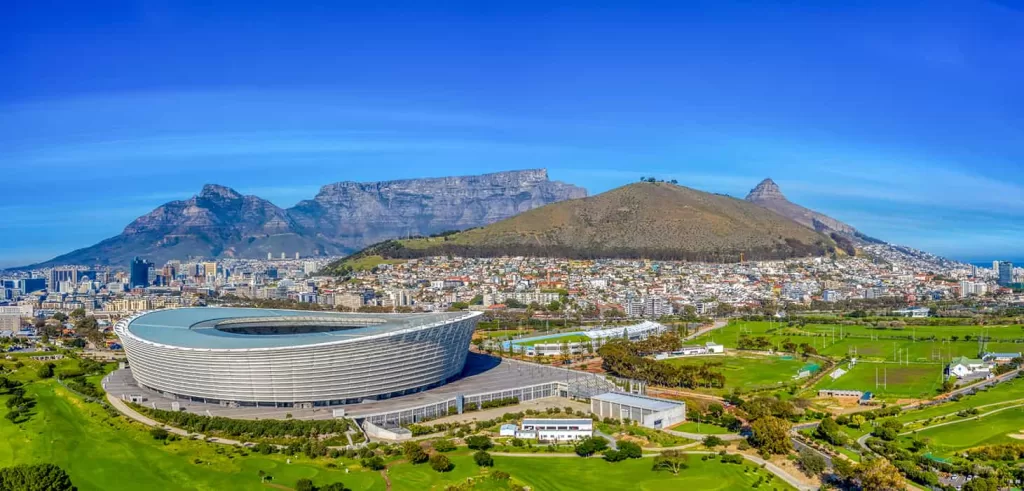He added that “between 2024 and 2026, growth is projected to average 1.6%.” Analysts from Investec, Standard Chartered Bank, and other finance institutions expect interest rates and inflation to trend down later this year, which could boost GDP growth.
A panel of FocusEconomics economists sees South Africa’s rand currency stabilizing to 18.48 rands to the dollar by the end of 2024. The highly volatile currency has been susceptible to economic shocks, further spelling challenges to the economy and the operating framework for companies.
The effect of South Africa’s currency weakness pales in comparison to the state of the economy in the Southern African Development Community, where Angola’s heavy debt burden and Zimbabwe’s incompetent economic leadership are big problems for investors looking for alternatives, according to Charlie Robertson, the head of macro strategy at Dubai-headquartered investment manager FIM Partners.
Coming Elections
With South Africa approaching elections in May, Tatonga Rusike, sub-Saharan Africa economist at Bank of America, underscores that leadership continuity at the Treasury to ensure the continued implementation of sound fiscal policies is critical to South Africa’s investment attractiveness.
Opinion polls suggest that the governing African National Congress (ANC) party could fail to win an outright majority and may need to form a coalition to remain in government.
The “outcome of the elections could introduce uncertainties, making sustained leadership crucial for navigating the country’s economic challenges” effectively, says Rusike.
Yet he adds that South Africa’s budget presentation in February “looked beyond the elections and refuted suggestions of populist spending before voting.”
With President Cyril Ramaphosa pledging to institute reforms in infrastructure and logistics issues such as electricity supply, railways and ports, there is renewed optimism that South Africa could turn around weaknesses that are unnerving investors.
For example, Wrenelle Stander, CEO of Wesgro, the tourism, trade and investment promotion agency for Cape Town and the Western Cape, touts the administration’s keenness to allow for collaborations between the public and private sectors in the economy.
“Our investment environment is relatively conducive, focusing on cutting red tape and rolling out the red carpet for investors. There is an openness to collaboration across the public-private ecosystem,” says Stander.
According to Bank of America’s 2024 South Africa Fund Manager Survey, preferred sectors for investment in South Africa include banks, general industrials, food production, health care and retail. However, telecoms, gold mining and real estate are now considered out of favor.
Although South Africa’s net inflows of foreign direct investment (FDI) have historically averaged just over 1% of GDP over the last decade, there have been some bright spots, including its recent appeal for renewable energy investments.
“In 2023, we saw a significant increase in imports of and investment in solar panels, supported by the removal of limits on private sector power generation and tax rebates of 125% on renewables,” says Zahabia Gupta, director for sovereign ratings at S&P Global Ratings.
The 2024 budget statement announced in February “included a new incentive of 150% tax deduction for local manufacturing of electric and hydrogen vehicles” starting in March 2026, she adds.
And playing to South Africa’s advantage are “very good institutions like the reserve bank; smart, conservative banks; and good, well-managed corporates,” says Robertson.
South Africa has also just introduced a new policy, the Trusted Employer Scheme, which seeks to fast-track work permits for skilled personnel, senior managers, and executives of international companies investing in the country.
This was “huge for global corporates, given the brain drain,” as “South Africa will slash the time taken to issue work permits to foreign executives and technicians employed by the biggest companies in the country in a bid to lure overseas investors,” says Marco Olevano, a South African market analyst.
In the May elections, Ramaphosa will be seeking election to a second term, against major rivals who include leaders of the main opposition parties, the Democratic Alliance and Economic Freedom Fighters. Former President Jacob Zuma has parted ways with Ramaphosa’s ruling ANC party and is now working with the opposition party uMkhonto we Sizwe, which was once the ANC’s military wing.
Jee-A van der Linde, senior economist at Oxford Economics in Africa, sees the South African 2024 election as presenting uncertainty to the country’s macroeconomic fundamentals when investment assets are underperforming. He believes there might be “a temporary post-election relief rally following a protracted period of uncertainty” ahead of the crucial poll.
With investors adopting a wait-and-see attitude pending the election, South Africa’s FDI inflows roughly halved to $1.4 billion in the third quarter of 2023 compared to the second quarter, data from the country’s central bank showed.
This was despite the World Bank’s approval in October of a $1 billion loan to help, in part, South Africa resolve its debilitating electricity supply crisis, which is grounding productivity and pushing up the cost of doing business, according to business leaders.
According to FIM’s Robertson, South Africa’s “infrastructure advantages have eroded over the last 10-20 years, from electricity (Eskom) to transport (Transnet)—while the country’s debt burden” has risen.
Some investors were apprehensive; although, according to Robertson, “sluggish economic growth is the main deterrent” for foreign direct investors. The post-election period may provide some direction for investors who have been keeping faith with the current leadership despite the myriad challenges the country faces.
